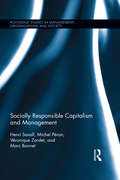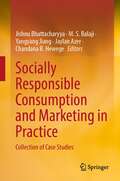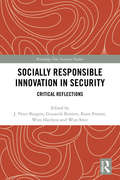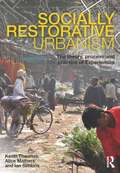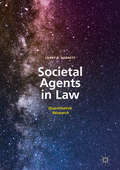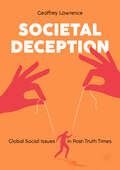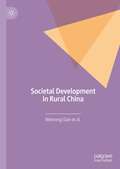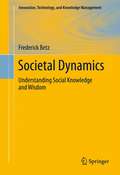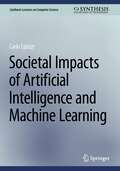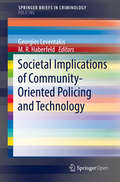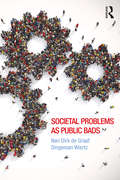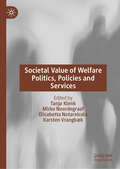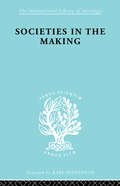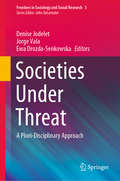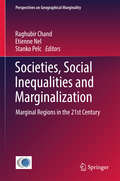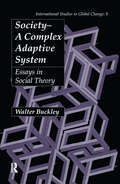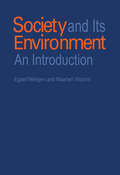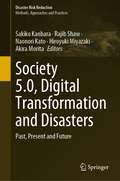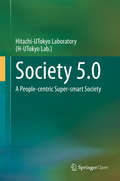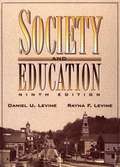- Table View
- List View
Socially Responsible Capitalism and Management (Routledge Studies in Management, Organizations and Society)
by Marc Bonnet Henri Savall Michel Péron Véronique ZardetIn the current crisis context, capitalism is questioned by its detractors or defended by its partisans. The concept of Socially Responsible Capitalism (SRC) is based on the entrepreneurial spirit. It encourages exemplary behaviors, such as effective, efficient and ethical behaviors, by stimulating social responsibility of companies and organizations. This is combined with the development of economic empowerment and legitimate efforts of each citizen-actor. Socially Responsible Capitalism and Management does not confuse financial capitalism and entrepreneurial capitalism. The first one improves the creation of artificial value which leads to financial bubbles that periodically burst and bankrupt the real economy. Quite the reverse, entrepreneurial capitalism creates both solid economic value and employment. This is justified by the production of goods and services that meet legitimate needs of consumer-citizens. This book shows that by putting Human Beings at the heart of action enables producing sustainable economic value, and anthropological values which are inseparable. The innovative aspect of this book lies in its analysis starting from the macro-economic level to the individual one, by presenting a detailed analysis of the micro-economic level of companies within its managerial issues. Socially Responsible Capitalism and Management is dedicated to present the different aspects of SRC for the Society, companies and organizations and also individual actors, as citizens, producers and consumers.
Socially Responsible Consumption and Marketing in Practice: Collection of Case Studies
by Jishnu Bhattacharyya M. S. Balaji Yangyang Jiang Jaylan Azer Chandana R. HewegeThe book provides an overview of socially responsible consumption and marketing, as well as a collection of teaching cases that discuss and emphasize how 21st-century organizations, both for-profit and non-profit, are addressing socially responsible consumers and meeting their changing needs while remaining profitable. Consumers, governments, academics, and practitioners are becoming more interested in promoting positive social changes through consumption. As a result, this book aims to understand the practice of marketing in bringing about positive social change through real-life case studies. Consumption by socially responsible consumers who care about the social good is unique, not only because of its inter-disciplinary and substantive subject matter but also because it presents challenges and pushes organizations to make significant changes in the ways they have been accomplishing organizational activities in the twenty-first century, from procurement to production to sales and services. The book goes beyond individual consumers and their lifestyles to promote the scope of discussing marketing strategies. It seeks to comprehend how people consume and how socially responsible consumption is conceived. The case studies present and pursue integrated solutions for more sustainable consumption. This is a must-read for marketers who want to reach out to socially responsible consumers.
Socially Responsible Innovation in Security: Critical Reflections (Routledge New Security Studies)
by Genserik Reniers Koen Ponnet J. Peter Burgess Wim Hardyns Wim SmitThis book examines the possibility of socially responsible innovation in security, using an interdisciplinary approach. Responsible innovation in security refers to a comprehensive approach that aims to integrate knowledge related to stakeholders operating at both the demand and the supply side of security – technologists, citizens, policymakers and ethicists. Security innovations can only be successful in the long term if all the social, ethical and ecological impacts, and threats and opportunities, both short term and long term, are assessed and prioritized alongside technical and commercial impacts. The first part of this volume focuses on security technology innovation and its perception and acceptance by the public, while the second part delves deeper into the processes of decision-making and democratic control, raising questions about the ethical implications of security ruling. This book will be of much interest to students of critical security studies, sociology, technology studies and IR in general.
Socially Restorative Urbanism: The theory, process and practice of Experiemics
by Kevin Thwaites Alice Mathers Ian SimkinsThe need for a human-orientated approach to urbanism is well understood, and yet all too often this dimension remains lacking in urban design. In this book the authors argue for and develop socially restorative urbanism – a new conceptual framework laying the foundations for innovative ways of thinking about the relationship between the urban spatial structure and social processes to re-introduce a more explicit people-centred element into urban place-making and its adaptation. Focusing on this interplay between humans and the built environment, two new concepts are developed: the transitional edge – a socio-spatial concept of the urban realm; and Experiemics – a participative process that acts to redress imbalances in territorial relationships, defined in terms of the awareness of mine, theirs, ours and yours (MTOY). In this way, Socially Restorative Urbanism shows how professional practice and community understanding can be brought together in a mutually interdependent and practical way. Its theoretical and practical principles are applicable across a wide range of contexts concerning human benefit through urban environmental change and experience, and it will be of interest to readers in the social sciences and environmental psychology, as well as the spatial planning and design disciplines.
Socially Strong, Emotionally Secure: 50 Activities to Promote Resilience in Young Children
by Karen Cairone Nefertiti BruceNow more than ever, adults must help children develop the skills necessary to navigate through life successfully. By focusing on building social and emotional strength, we increase children’s resilience and prepare them to handle the challenges in life. The strategies and activities in Socially Strong, Emotionally Secure help children become socially and emotionally healthy for life. Organized into five chapters, the activities support and build resilience in children ages 3 to 8.
Societal Agents in Law: Quantitative Research
by Larry D. BarnettIn this two-volume set, Larry D. Barnett delves into the macrosociological sources of law concerned with society-important social activities in a structurally complex, democratically governed nation. Barnett explores why, when, and where particular proscriptions and prescriptions of law on key social activities arise, persist, and change. The first volume, Societal Agents in Law: A Macrosociological Approach, puts relevant doctrines of law into a macrosociological framework, uses the findings of quantitative research to formulate theorems that identify the impact of several society-level agents on doctrines of law, and takes the reader through a number of case analyses. The second volume, Societal Agents in Law: Quantitative Research, reports original multivariate statistical studies of sociological determinants of law on specific types of key social activities. Taken together, the two volumes offer an alternative to the almost-total monopoly of theory and descriptive scholarship in the macrosociology of law, comparative law, and history of law, and underscore the value of a mixed empirical/theoretical approach.
Societal Deception: Global Social Issues in Post-Truth Times
by Geoffrey LawrenceThis book provides a comprehensive overview of ‘societal deception’ - how and why people are deceived and led to believe fake news. Coherently blending critical political economy and sociology, the author provocatively examines how corporations, political parties, the media, think tanks and assorted 'influencers' seek to manipulate public opinion to achieve their goals. This book spans an array of contemporary topics and issues not normally tackled by a single writer – the media, genetic engineering, fast food, environmental pollution, climate change, economic inequality, political manipulations, sports, and religion. While critical in subject matter, and replete with easily accessible and reliable sources, this book is highly readable and entertaining for the general as well as academic audience interested in current global issues.
Societal Development in Rural China
by Wenrong QianThis book provides a broad survey of Chinese rural households, examining ongoing changes in Chinese society and economy through the lens of the situation of rural families in China. Based on data from Zhejiang University’s China Rural Household Panel Survey (CRHPS) in 2015 on rural households, which analyses all aspects of grass-roots rural households in China, this volume offers a scientific analysis of social development in rural China, exploring notably the basic structure, employment situation, income and expenditure, social security, and education situation of Chinese rural households, as well as the governance and public services of rural communities.
Societal Dynamics
by Frederick BetzAt both a micro-information level and a macro-societal level, the concepts of "knowledge" and "wisdom" are complementary - in both decisions and in social structures and institutions. At the decision level, knowledge is concerned with how to make a proper choice of means, where "best" is measured as the efficiency toward achieving an end. Wisdom is concerned with how to make a proper choice of ends that attain "best" values. At a societal level, knowledge is managed through science/technology and innovation. And while science/technology is society's way to create new means with high efficiencies, they reveal nothing about values. Technology can be used for good or for evil, to make the world into a garden or to destroy all life. It is societal wisdom which should influence the choice of proper ends -- ends to make the world a garden. How can society make progress in wisdom as well as knowledge? Historically, the disciplines of the physical sciences and biology have provided scientific foundations for societal knowledge But the social science disciplines of sociology, economics, political science have not provided a similar scientific foundation for societal wisdom. To redress this gap, Frederick Betz examines several cases in recent history that display a fundamental paradox between scientific/technological achievement with devastating social effects (i.e., historical events of ideological dictatorships in Russia, Germany, China, and Yugoslavia). He builds a new framework for applying social science perspectives to explain societal histories and social theory. Emerging from this methodological and empirical investigation is a general topological theory of societal dynamics. This theory and methodology can be used to integrate history and social science toward establishing grounded principles of societal wisdom.
Societal Impacts of Artificial Intelligence and Machine Learning (Synthesis Lectures on Computer Science)
by Carlo LipizziThis book goes beyond the current hype of expectations generated by the news on artificial intelligence and machine learning by analyzing realistic expectations for society, its limitations, and possible future scenarios for the use of this technology in our current society. Artificial Intelligence is one of the top topics today and is inflating expectations beyond what the technology can do in the foreseeable future. The future cannot be predicted, but the future of some elements of our society, such as technology, can be estimated. This book merges the modeling of human reasoning with the power of AI technology allowing readers to make more informed decisions about their personal or financial decisions or just being more educated on current technologies. This book presents a model that sketches potential future scenarios based on a discussion of the expectations today, the analysis of the current gap in the literature, and a view of possible futures in terms of technology and use cases. Specifically, this book merges literature on the technology aspects, the sociological impacts, and philosophical aspects.
Societal Implications of Community-Oriented Policing and Technology (SpringerBriefs in Criminology)
by M. R. Haberfeld Georgios LeventakisThis Brief presents new approaches and innovative challenges to address bringing technology into community-oriented policing efforts. “Community-oriented policing” is an approach that encourages police to develop and maintain personal relationships with citizens and community organizations. By developing these partnerships, the goal is to enhance trust and legitimacy of police by the community (and vice versa), and focus on engaging the community crime prevention and detection efforts for sustainable, long-term crime reduction.The contributions to this volume emphasize the societal implications of new technologies for community-oriented policing goals, such as: -Strengthening community policing principles through strengthed community feeling and lower feeling of insecurity - Reducing the fear of crime and enhancing the perception of security in large, urban environments -Enhancing citizens feelings' of empowerment, belonging, and collective efficacy Contributions to this volume were developed out of the Next Generation Community Policing (NGCP) International Conference was co-organized by nine contributing research and development projects, funded by the Horizon 2020 SECURITY Program of the European Commission. It will be of interest to researchers in criminology and criminal justice, as well as related fields such as sociology, public health, security, IT and public policy.
Societal Problems as Public Bads
by Nan Dirk de Graaf Dingeman WiertzCorruption, crime, economic inequality, religious fundamentalism, financial crises, environmental degradation, population ageing, gender inequality, large-scale migration… This book tackles many of the most pressing problems facing societies today. The authors demonstrate that similar social mechanisms lie behind many of these seemingly disparate problems. Indeed, many societal problems can be traced back to behaviours that are perfectly rational and often well-intended from an individual perspective. Yet, taken together these behaviours can – paradoxically – give rise to unintended and undesirable outcomes at the society level. In addition to addressing the causes of societal problems, the book explains why some problems rank higher on the public agenda than others. Moreover, it is shown how government intervention may sometimes provide a cure, yet other times exacerbate existing problems or create new problems of its own. This book includes an extensive amount of data on trends and geographic variation in the prevalence of different problems, as well as telling examples – both recent and historical – from a variety of countries to support its key arguments. Employing a bold multidisciplinary approach, the authors draw on insights from across the social sciences, including sociology, economics, anthropology, criminology, and psychology. Throughout the book, students are introduced to analytical concepts such as free-riding, herding behaviour, principal-agent relations and moral hazard. These concepts are essential tools for better understanding the roots of many societal problems that regularly make headlines in the news. This improved understanding will, in turn, be critical for ultimately finding solutions to these problems.
Societal Self-empowerment in Germany: A Comparison of Fridays for Future and Corona Skepticism
by Reimut Zohlnhöfer Peter Kirsch Hanno KubeMost recently, various groups have drawn attention to their political causes by demonstratively breaking the law, whether it is violating compulsory education in Fridays for Future demonstrations or refusing to abide by pandemic containment measures among critics of the Corona policy. This book explores what lies behind these rule-breaking events: supporters of the Fridays for Future movement, while dissatisfied with climate policy, are well integrated into the political system; people who may not abide by Corona rules, on the other hand, sometimes exhibit considerable alienation from and distrust of the political system.
Societal Value of Welfare Politics, Policies and Services
by Mirko Noordegraaf Tanja Klenk Elisabetta Notarnicola Karsten VrangbækWelfare state governance is about tackling social issues, empowering citizens, and adding societal value. It is also about improving public health and quality of life, alleviating inequality, and reducing social polarization. Bringing together researchers from around the world, this volume examines how politics, policies and services contribute to the strengthening of societal value. It assesses the societal impact of policies and professional actions, the ways in which social inequalities and dependencies are traced, and how policies and professional services respond to new societal challenges. It also considers what arrangements enable policies and services to generate more value, and the ways in which politicians, policymakers, public executives, public managers, professionals and employees prepare for this. Comparative and interdisciplinary in nature, this volume will appeal to all those interested in public administration, political science and sociology.
Societies In Making Ils 89 (International Library of Sociology)
by Hilda JenningsPublished in 1998, Societies In Making IIs 89 is a valuable contribution to the field of Sociology & Social Policy.
Societies Under Threat: A Pluri-Disciplinary Approach (Frontiers in Sociology and Social Research #3)
by Jorge Vala Denise Jodelet Ewa Drozda-SenkowskaThis book illuminates the importance of threat on the representation of everyday life, from an interdisciplinary perspective. Divided into three parts, the book sets out by addressing the conceptual aspects of threat and by opening views on phenomena and social processes associated with threat. It shows how threat constitutes an analytical category that simultaneously involves social, psychological, religious, historical and political factors, and calls for a sufficiently broad conceptual definition to integrate pluri-disciplinary contributions. The second part focuses on the building of threats, mainly the environmental threats that have reached a tragic dimension today and are a core aspect of world concerns, the contemporary global terrorism, the migrations and the challenges these bring to contemporary societies, as well as the threats associated with the emergence of nationalism and the diverse aspects of excluding the Other. The final part examines the coping strategies, including oblivion, denial and defiance associated with different sources of threats, for instance those arising from epidemic and collective diseases, financial technology, natural disasters and collective traumas.
Societies, Social Inequalities and Marginalization
by Raghubir Chand Etienne Nel Stanko PelcThis book provides an overview of marginality or marginalization, as a concept, characterizing a situation of impediments - social, political, economic, physical, and environmental - that impact the abilities of many people and societies to improve their human condition. It examines a wide range of examples and viewpoints of societies struggling with poverty, social inequality and marginalization. Though the book will be especially interesting for those looking for insights into the situation and position of ethnic groups living in harsh mountainous conditions in the Himalayan region, examples from other parts of the world such as Kyrgyzstan, Israel, Switzerland and Finland provide an opportunity for comparison of marginality and marginalization from around the world. Also addressed are issues such as livelihood, outmigration and environmental threats, taking into account the conditions, scale and perspective of observation. Throughout the text, particular attention is given to the context and concept of 'marginalization', which sadly remains a persistent reality of human life. It is in this context that this book seeks to advance our global understanding of what marginalization is, how it is manifested and what causes it, while also proposing remedial strategies.
Society
by Walter BuckelyFirst published in 1998. Routledge is an imprint of Taylor & Francis, an informa company.
Society & Its Environment: An Introduction
by TellegenFirst Published in 1998. Routledge is an imprint of Taylor & Francis, an informa company.
Society 5.0, Digital Transformation and Disasters: Past, Present and Future (Disaster Risk Reduction)
by Rajib Shaw Sakiko Kanbara Hiroyuki Miyazaki Naonori Kato Akira MoritaThis book presents the evolution of the science technology paradigm in Japan and analyzes the critical community and local governance issues from the perspectives of the changing risk landscape, Society 5.0, and digital transformation. It also provides suggestions for the future development of a resilient society and community, by drawing lessons from other countries.Advancements in science technology in recent decades in Japan and the world might have increased our capacity to tackle the adverse human consequences of various kinds of disasters and environmental issues. However, the accompanied and interlinking phenomena of urbanization, climate change, rural to urban migration, population decreases, and aged population have posed new challenges, especially in the small, medium-sized cities, and in rural areas of Japan. This is also enhanced by the risk of cascading, complex and systemic risk, which is defining a new normal as “living with uncertainties”.Society 5.0 is defined as "A human-centered society that balances economic advancement with the resolution of social problems by a system that highly integrates cyberspace and physical space." Society 5.0 was proposed in the 5th Science and Technology Basic Plan as a future society that Japan should aspire to. Society 5.0 achieves a high degree of convergence between cyberspace (virtual space) and physical space (real space), compared with the past information society (Society 4.0) that people would access a cloud service (databases) in cyberspace via the Internet and search for, retrieve, and analyze information or data.In Japan, in the initial stage, a great deal of confusion about the number of people infected with coronavirus occurred. Not only made it inefficient, but it did not produce the accurate data needed for critical decisions.Japan may have unique disadvantages compared with other countries. Trying to drive digitization without thoroughly understanding these disadvantages and addressing them head-on will only lead to failed digital transformations.With these three pillars of changing risk landscape, Society 5.0, and Digital transformation drive, the book will analyze the evolution of the science technology paradigm in Japan, will go deeper into the critical community and local governance issues, and will provide suggestions for future development of resilient society and community, by drawing lessons from overseas disaster risk reduction.
Society 5.0: A People-centric Super-smart Society
by Hitachi-UTokyo LaboratoryThis open access book introduces readers to the vision on future cities and urban lives in connection with “Society 5.0”, which was proposed in the 5th Basic Science and Technology Plan by Japan’s national government for a technology-based, human-centered society, emerging from the fourth industrial revolution. The respective chapters summarize the findings and suggestions of joint research projects conducted by H-UTokyo Lab. Through the research collaboration and discussion, this book explores the future urban lives under the concept of “Society 5.0”, characterized by the key phrases of data-driven society, knowledge-intensive society, and non-monetary society, and suggests the directionality to which the concept should aim as Japan’s technology-led national vision. Written by Hitachi’s researchers as well as academics from a wide range of fields, including engineering, economics, psychology and philosophy at The University of Tokyo, the book is a must read for members of the general public interested in urban planning, students, professionals and researchers in engineering and economics.
Society The Basics, Fourteenth Edition
by John J. MacionisSociety: The Basics utilizes a complete theoretical framework and a global perspective to offer students an accessible and relevant introduction to sociology. John Macionis, author of the best-selling Introductory Sociology franchise over the last three decades, empowers students to see the world around them through a sociological lens, helping them to better understand their own lives. Informative as well as engaging, Society: The Basics will change the way readers see the world, and open the door to a new perspective and new opportunities. In addition to extensively updated data, the Fourteenth Edition offers engaging discussions of hot-button contemporary topics such as the increased proliferation of social media as well as expanded coverage of race, class, and gender.
Society and Economy: Framework and Principles
by Mark GranovetterA work of exceptional ambition by the founder of modern economic sociology, this first full account of Mark Granovetter’s ideas stresses that the economy is not a sphere separate from other human activities but is deeply embedded in social relations and subject to the same emotions, ideas, and constraints as religion, science, politics, or law.
Society and Education
by Daniel U. Levine Rayna F. LevineThe Ninth Edition of Society and Education continues its tradition of incorporating forward-looking material. Reflecting both recent developments and long-range trends involving the relationships between education and other social institutions, it continues to provide a balanced treatment of controversial issues — in sufficient depth to help readers understand complicated and important topics to current and future teachers and administrators.
Society and HRM in China
by Malcolm WarnerThis volume looks at the relationship between society and human resource management (HRM) in China. In doing so it asks how representative the latter is of the former. The contributors argue that there needs to be a minimum degree of consonance between these two variables if HRM is to be sufficiently underpinned by social reality. It is only in a wider framework that ‘people-management’ in general – and in China in particular – can be fully understood, whether through theory or through practice. Society and HRM in China explores the changes in Chinese society over the last century and then goes on to analyse how these changes have shaped China’s HRM. Arguably, HRM did not emerge from the void; it was shaped by the societal culture from which it sprung and the economic forces influencing its institutions and organizations. However, there is very little academic literature about the relationship between contemporary Chinese society and its HRM which isn’t extremely specific. As such, much of the research in this collection is not only relatively representative but also highly cross-sectional. The contributions are all drawn from experts in the field across the disciplines, hailing from a diverse range of national origins and educational institutions. They cover a wide range of topics, approaches and emphases. This book was originally published as a special issue of The International Journal of Human Resource Management.
